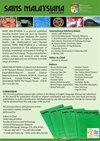Heat Stress in Vegetables: Impacts and Management Strategies – A Review
IF 0.7
4区 综合性期刊
Q3 MULTIDISCIPLINARY SCIENCES
引用次数: 0
Abstract
Global climate change has not only caused a significant rise in the average temperature around the world but has also threatened crop productivity and food security. Heat stress disrupts various plant physiological and biochemical processes, such as inhibition of growth and development, reduction of photosynthesis rate and nutrient uptake, consequently causing yield losses. The destructive effects of heat stress are expected to worsen in the coming years. Thus, it has become imperative to understand how vegetables respond and adapt to heat stress in order to improve their heat tolerance ability. Various approaches have been adopted to enhance heat stress tolerance in vegetables, including modifying cultural practices and crop improvements through several breeding methods. This review gives comprehensive and up-to-date information on the effects of heat stress on vegetables; and existing as well as emerging methods adopted to enhance heat tolerance in vegetables. It also provides a brief overview of a new method called speed breeding, which can be leveraged to fast-track the breeding process for developing heat stress-tolerant vegetables.蔬菜热胁迫:影响和管理策略综述
全球气候变化不仅导致全球平均气温显著上升,而且还威胁到作物生产力和粮食安全。热胁迫破坏植物的多种生理生化过程,如抑制生长发育、降低光合速率和养分吸收,从而导致产量损失。热应激的破坏性影响预计将在未来几年恶化。因此,了解蔬菜如何响应和适应热胁迫,以提高其耐热能力已成为当务之急。为了提高蔬菜的耐热性,人们采用了多种方法,包括改变栽培方法和通过几种育种方法改进作物。这篇综述提供了关于热胁迫对蔬菜影响的全面和最新的信息;以及现有的和新兴的提高蔬菜耐热性的方法。它还提供了一种称为快速育种的新方法的简要概述,这种方法可以用来快速跟踪培育耐热蔬菜的育种过程。
本文章由计算机程序翻译,如有差异,请以英文原文为准。
求助全文
约1分钟内获得全文
求助全文
来源期刊

Sains Malaysiana
MULTIDISCIPLINARY SCIENCES-
CiteScore
1.60
自引率
12.50%
发文量
196
审稿时长
3-6 weeks
期刊介绍:
Sains Malaysiana is a refereed journal committed to the advancement of scholarly knowledge and research findings of the several branches of science and technology. It contains articles on Earth Sciences, Health Sciences, Life Sciences, Mathematical Sciences and Physical Sciences. The journal publishes articles, reviews, and research notes whose content and approach are of interest to a wide range of scholars. Sains Malaysiana is published by the UKM Press an its autonomous Editorial Board are drawn from the Faculty of Science and Technology, Universiti Kebangsaan Malaysia. In addition, distinguished scholars from local and foreign universities are appointed to serve as advisory board members and referees.
 求助内容:
求助内容: 应助结果提醒方式:
应助结果提醒方式:


